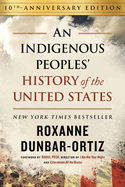
A bold, expansive and detailed documentation of the founding of the United States from the perspective of Native communities, An Indigenous Peoples' History of the United States (10th Anniversary Edition) by Roxanne Dunbar-Ortiz challenges readers to reconsider the official version of U.S. history celebrated in popular culture and taught in schools, while shattering long-established myths. Dunbar-Ortiz (Not a Nation of Immigrants; Blood on the Border) is a formidable, mesmerizing storyteller, her writing distinguished by an unflinching confrontation with the country's white supremacist roots and their modern-day impact.
Historian and activist Dunbar-Ortiz strives to inspire in readers "liberation from a false national story," so that recent trends, such as the ascent of armed nationalist militias in the past decade, can be understood in their true historical context. Cross-referencing past events with present realities, she aims to provide a frame of reference from which to make educated decisions about the direction of our country, including ongoing military warfare strategy, the long-awaited return of sacred sites to Indigenous nations, and challenging the white supremacist foundation of United States institutions. With the present informing every chapter, the central question she pursues is, "How might acknowledging the reality of US history work to transform our society?"
Dunbar-Ortiz distills four centuries' worth of oral histories of Indigenous peoples, and combines these valuable narratives with meticulous archival research to present a devastating, utterly fascinating account of the United States as a "colonialist settler-state... [that] crushed and subjugated the original civilizations in the territories it now rules." With violence as its strategic essence, the colonial army threatened Indigenous communities with two equally untenable options: unconditional surrender or complete annihilation. This history is "a tale of the Indigenous peoples' resistance, a tale of their constant fight against a barbaric ethnic-cleansing enterprise, from its beginning until today."
Extermination of Indigenous nations by genocide as the accepted national policy of the settlers was justified by a Puritan belief in a covenant with God to take the land. Here, the author shares in breathtaking detail the untold story of the stealing and appropriating of Native harvest fields, their roads, their raw material, their infrastructures, their lives and their futures. In the process, she lays bare the vast disconnect between the documented, violent reality of how the United States came into being and the rosy narrative celebrated in popular books and movies. Novelist James Fenimore Cooper's blatant reinvention of the birth of the United States in his novel The Last of the Mohicans has become the preferred origin story, describing the nation's founding as a natural merger between Native and European worlds, with the last Native dying off ("as nature would have it") after handing the continent over to his adopted son, Hawkeye, a nativized settler.
Dunbar-Ortiz illustrates how colonial powers controlled Indigenous societies through Christian missionaries, and deployed alcohol as a "weapon of war." Citing a petition by a Catawba leader in 1754 asking North Carolina authorities to stop selling the deadly and addictive drink to his people, the author makes devastatingly clear how alcohol contributed to a breakdown in social order among Native communities.
Noting that Indigenous peoples thrived for millennia before they were displaced to fragmented reservations and economically decimated, Dunbar-Ortiz offers examples of bold historical resistance, pointing out that Native communities persist in their acts of resistance to this day. This includes asserting land rights, a prominent example of which is the Lakota Sioux's attempt to restore the Paha Sapa, or Black Hills, where the Mount Rushmore carvings have scarred the sacred site. Though the site is referred to as the "Shrine of Democracy" by the federal government, Dunbar-Ortiz calls it "a shrine of in-your-face illegal occupation and colonialism." The November 1969 seizure and subsequent 18-month occupation of Alcatraz Island in San Francisco Bay offers a spectacular example of heroic resistance, as Native activists attempted to reclaim the island under the terms of the 1898 Treaty of Fort Laramie.
Acknowledging that today there are more than 500 federally recognized Indigenous communities and nations, comprising nearly three million people in the United States, Dunbar-Ortiz reasons that reparations made to Indigenous peoples for reconstruction and expansion of Native nations, including the enforcement of treaty rights and the return of sacred sites, can only strengthen the country. The way forward, she concludes, is an honest reckoning with a horrific past, a past that continues to cast menacing shadows. For a just future to be realized, it will require extensive educational programs and support from all who claim the United States as their home. In that vein, and with an extensive updated introduction, An Indigenous Peoples' History of the United States offers readers an enlightening perspective on history, with in-depth coverage of white supremacy's deep, structural roots in the colonial foundation of the United States. --Shahina Piyarali

